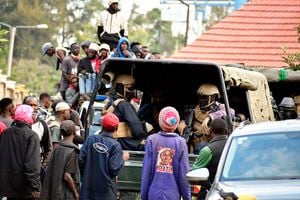
It was outrageous. On Monday night the 1,500 metres world record holder Faith Kipyegon finished in second place in the women’s 5,000 metres final, bagging silver behind compatriot Beatrice Chebet, who ran away with gold. However, Kipyegon was stripped of her medal allegedly for shoving with Ethiopia’s Gudaf Tsegay and a lane infringement.
I have rarely seen Kenyans on social media go apoplectic with rage as they did with the decision. But one didn’t have to be a Kenyan partisan. To any sober neutral watcher, Kipyegon was a woman more sinned against than sinning, and while she twisted to the side at the point of jostling, she had visibly kept her running legs inside the lane. Justice was done a while later, and her medal was reinstated.
However, the event revealed that in this Olympics, Kenya didn’t enter with the championship swagger and aura it carried to the Games in London in 2012, Rio de Janeiro in 2016, or even to the Covid-delayed 2020 Tokyo Olympics. The dirty reality of sports is that if you are the ultimate star, referees and umpires don’t disrespect you like that. When basketball superstar Michael Jordan was at the height of his game, it took a lot for referees to call a foul against him. In a clash between football great Lionel Messi and one Onesmus Okoth from Gor Mahia, the referees will blow the whistle against Okoth 75 per cent of the time.
Kenya is not alone. The African sporting leaders at the Olympics, like South Africa, are also quite diminished in these Games, and countries like Mozambique (with Maria Mutola who brought it its first Olympics gold in the 800 metres in Sydney in 2000) and Namibia (with world champion 100 and 200 metres racer) have faded from glory.
1980 Olympics
Tanzania looks certain to continue its 44-year barren run at the Olympics. It has not tasted an Olympic medal since Silvert Bayi and Suleiman Nyambui stepped on the podium at the 1980 Olympics in Moscow. As one sports writer told me, “Tanzanians know how to run and to play football, but they have forgotten how to win”. In the East African Community, Uganda is the only other nation that has consistently taken home at least one gold since London 2012.
Nevertheless, these Olympics have been a great story. They have shown us some very interesting changes happening in our world, and also how we got it right in the past.
It’s not just that these are the first Olympics where there is gender parity between male and female athletes. In Kenya, women are the new torchbearers. They are the ones who are bringing the bacon home. It seems the male species could have been ravaged by the Covid-19 pandemic in ways we are only beginning to appreciate from the Paris games fully.
And, looking back to London and Rio de Janeiro we see that African performances at those games were linked to the “Africa Rising” euphoria of the time when some of the continent’s brave men and women believed they could finally rule the world. The dream crashed, but it suggests that the stories you tell yourself about your place in the universe are the fuel that turns them into reality on the ground.
We have seen at the Olympics more evidence of the “Creolisation” of the world; especially Western Europe, North America, and even parts of Asia like Japan, with the rise (or at least visibility) of athletes of colour.
Indigenous content
We also saw, in the case of Uganda and Rwanda in the EAC, and several countries in Central and West Africa, what one might call “reverse diasporisation”. A good number of many Africa-descended athletes in the West returned to bolster the squads of the homelands of their parents and grandparents. Kenya is the exception, retaining a high level of “indigenous content” in its contingent.
The very worldly and delightful Olympics opening show, perhaps the best and most audacious there has ever been (you know it is when cultural and religious conservatives are furious), suggested that the games are becoming a social phenomenon and exhibition, as much as a sporting event. Medals have, therefore, become more important than ever before.
For us to rise to the top of the medal rankings, we have to begin competing in sports beyond football and running, which we couldn’t learn in the village. We have to jump into the water, take to cycling, skateboarding, and others where a rich haul of medals is hidden.
It might take a while. The middle-class family that produces skateboarders is not that of the rich Kaunda-suit-wearing senior civil servant whose wife chairs the church fundraising committee. It’s that of the t-shirt-wearing urban creature whose wife has a tattoo on her neck and four nose rings. If we clear a path for them, we shall soon have gold in sport climbing.
That said, it is disgraceful that Africa didn’t show up in a big way at breaking (break dancing) which made its debut in Paris. That’s supposed to be our thing.
The author is a journalist, writer, and curator of the “Wall of Great Africans”. Twitter@cobbo3










